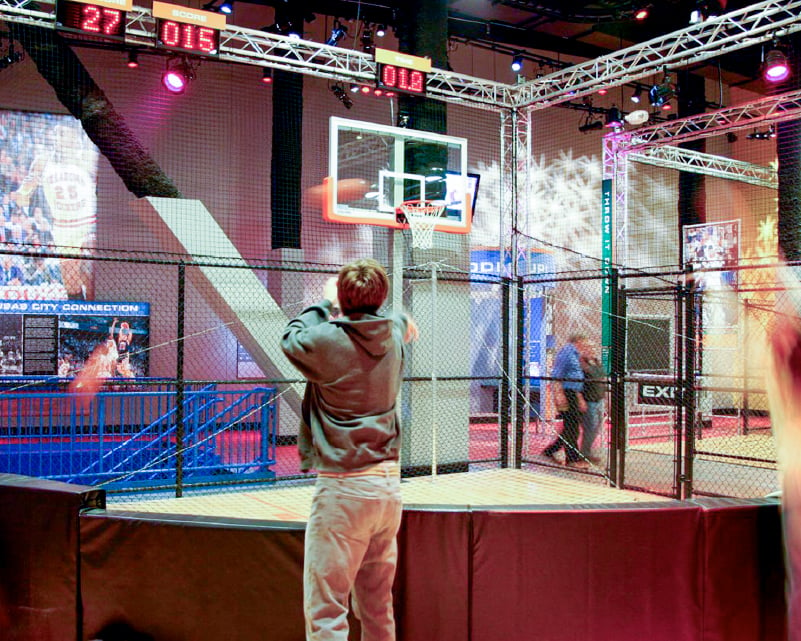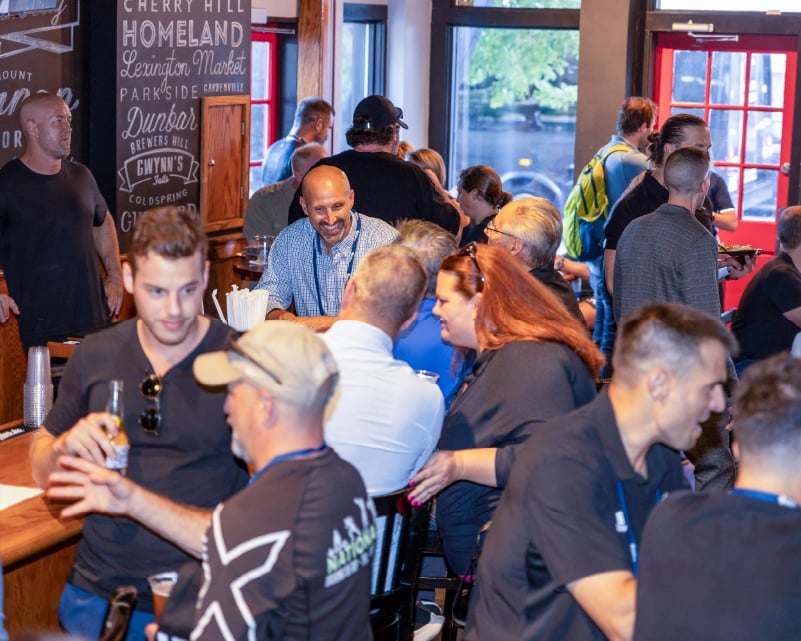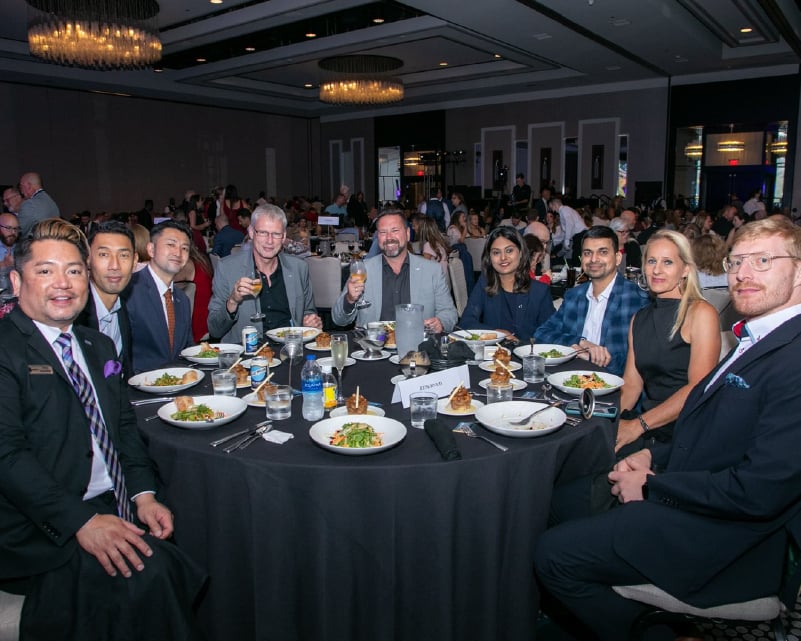Schedule
Get ready for a conference packed with insightful sessions, hands-on learning, and exclusive events — each designed to help you expand your knowledge, build connections, and elevate your impact in a highly competitive field.
Special Events
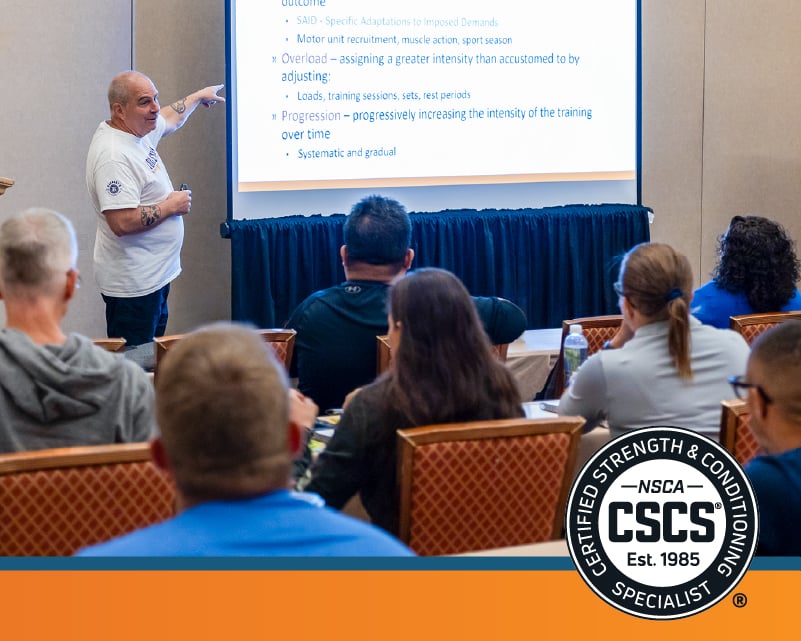
CSCS® Exam Prep Live Clinic
Tuesday, July 15 – Wednesday, July 16
Prepare for your CSCS exam with confidence. Attend this comprehensive review led by subject matter experts in an engaging, small class environment.
Add’l Purchase – Limited Spots
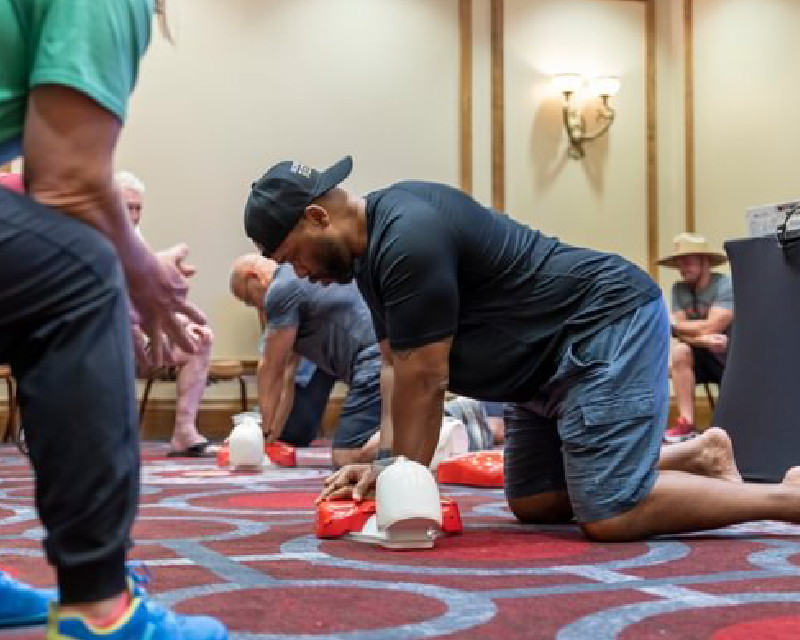
CPR/AED and First Aid Classes
Wednesday, July 16 | 8:00 am – 12:00 pm; 1:00 – 5:00 pm CT
Renew your CPR/AED and First Aid certifications conveniently on-site — required to stay NSCA-certified.
Add’l Purchase – Closes 8 am July 15
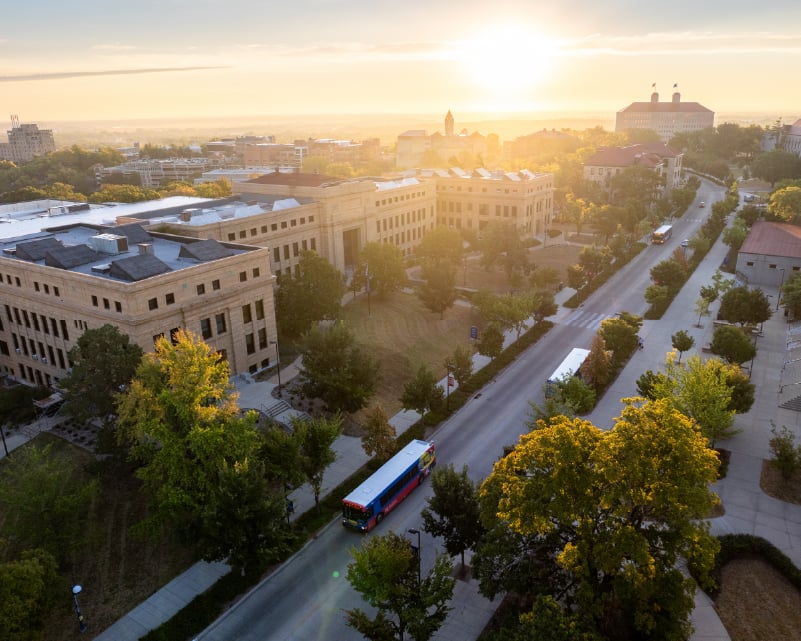
KU Field Trip and Facility Tour is *FULL*
Wednesday, July 16
Step inside Kansas University’s cutting-edge Jayhawk Athletic Performance Lab and elite training facilities on this behind-the-scenes tour led by Andy Fry.
Spots are full
Attendee & Exhibitor Party
Thursday, July 17 | 5:00 – 6:30 pm
Kick off the evening at The College Basketball Experience—an interactive museum where you can test your skills, relive iconic moments, and network.
Included with In-Person Registration
Exclusive RSCC Reception
Thursday, July 17 | 6:30 – 8:00 pm
Are you a Registered Strength and Conditioning Coach®? Talk shop and have a drink on us at No Other Pub sports bar in the Power & Light District.
RSCC Status and RSVP Required
2025 NSCA Awards Banquet
Friday, July 18 | 6:30 – 9:30 pm
Join us for an evening of excellence. Celebrate 7 NSCA Peer Awards leaders across strength and conditioning over a formal dinner with inspiring speeches.
Add’l Purchase – RSVP Required
Exhibit Hall
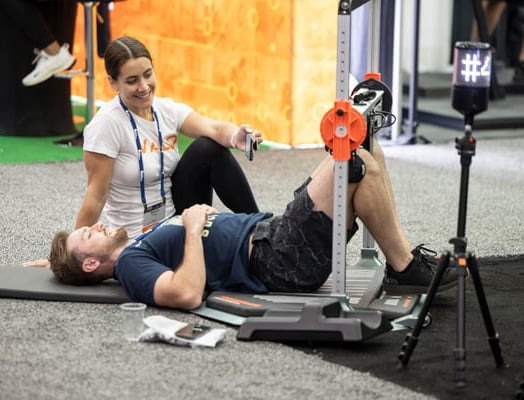
See It. Try It. Take It Back.
Shopping for upgrades or just scoping out what’s new? The Exhibit Hall is your hub for the latest innovations, hands-on product testing, and the best deals in strength and conditioning. Connect with top vendors, explore partnerships, and — if you’re lucky — walk away with a few freebies!
Plus, join us Wednesday evening on July 16 for our KICK-OFF PARTY with food and drinks and extra time to explore all the new tech and services.
Topic Areas
Tailor your NSCACon experience with eight distinct topic areas. Each session is tagged in the schedule to help you quickly find content that aligns with your interests, career goals, or specialty.
![]()
Sport Science and Performance Optimization: Apply testing, data analysis, and evidence-based methods to enhance performance outcomes.
![]()
Applied Physiology and Biomechanics: Explore physiological adaptations, movement mechanics, and muscle function to improve training.
![]()
Program Design and Practical Application: Develop structured training plans with proven methods to build strength, speed, and power.
![]()
Individualization for Diverse Populations: Tailor training for women, youth, and tactical professionals using research-driven insights.
![]()
Research and Education: Discover advancements in strength and conditioning research. Learn methods of teaching strength and conditioning in an academic setting.
![]()
Nutrition and Supplementation: Understand the science behind dietary strategies and supplements for performance and recovery.
![]()
Injury Risk Reduction, Rehab, and Return to Performance: Mitigate injury risk, optimize rehab, and implement techniques to rebuild strength and mobility.
![]()
Business, Leadership, and Career Development: Gain fresh perspectives on facility management, leadership, and long-term professional growth.
Full Schedule
| Event Itinerary - Wednesday, July 16 - Central Standard Time |
|
7:30 AM - 4:30 PM CSCS Exam Prep (Additional Purchase) The 2-day CSCS Exam Prep Live Clinic (begins Tuesday, July 15) This clinic is a comprehensive review of the knowledge, skills, and abilities required to successfully pass the CSCS certification exam. |
|
8:00 AM - 5:00 PM NSCA Board of Directors Meeting |
|
8:00 AM - 5:00 PM International Meeting Room |
|
8:00 AM - 5:00 PM CPR/AED/First Aid Certification by Mike Jarrous, MA, NSCA-CPT, EMT-B FIRST RESPONDER TRAINING We're offering two separate First Responder Training sessions at this year's conference. Keep your certification up to date and choose the CPR/AED/First Aid training that best works with your conference schedule.
Each class will go over CPR/AED for Adults, Children and Infants as well as First Aid emergencies such as bleeding control, splinting, epipen injection, assessing head injuries, recognizing stroke, diabetic, heart, heat and cold related emergencies. registration closes 8am July 15 |
|
12:00 PM - 6:00 PM Registration Open |
|
9:00 AM - 5:30 PM Field Trip to KU is *FULL* Here is a golden opportunity to see up close and in person what goes on in a sport science lab that focuses on elite sport and developing athletes. This pre-conference event is designed for coaches from high school to pro, all types of sports scientists and practitioners, strength & conditioning specialists, sports medicine personnel, and anyone involved with human performance training.
Visit here for the day's agenda. |
|
2:00 PM - 5:00 PM NSCA Store Open |
|
2:00 PM - 2:50 PM Why Study Design Matters by Dawn Anderson, PhD, CSCS, TSAC-F
Research Lecture |
|
2:00 PM - 3:50 PM Current Concepts in Tissue Residency in Training & Rehab by Charlie Weingroff, DPT, ATC, CSCS
Workshop sponsored by Perform Better |
|
2:00 PM - 3:50 PM Unlock the Power Beneath: Open & Closed Chain Foot Mobilization by Rocky Snyder, CSCS, NSCA-CPT
Workshop sponsored by Perform Better |
|
3:00 PM - 3:50 PM Nutritional Considerations Across the Female Athlete Lifespan by Katie Hirsch, PhD
Research Lecture |
|
3:00 PM - 3:50 PM Basketball Special Interest Group Meeting Join any Special Interest Group (SIG) meeting to connect with like-minded professionals, hear the latest updates, and engage in discussions led by SIG leadership. |
|
3:00 PM - 3:50 PM Opportunities with the Army’s H2F Program by Serco Staff
Flip the script and engage in interactive discussions with leaders in the field. No lectures — just open dialogue to inspire your mindset and next career move. Career Connection sponsored by Serco |
|
3:00 PM - 6:00 PM Exhibit Hall Open |
|
4:00 PM - 4:50 PM Statistical and Machine Learning Models for Sport and Research Scientist by Samuel Montalvo, CPSS, CSCS,*D
Research Lecture |
|
4:00 PM - 4:50 PM Building a Strong Strength and Conditioning Staff by Greg Werner, MS, CSCS, RSCC*E
Flip the script and engage in interactive discussions with leaders in the field. No lectures — just open dialogue to inspire your mindset and next career move. Career Connections |
|
4:00 PM - 5:50 PM Why You’re Still in Pain: The New Science of Chronic Pain by Jessica Bento, MPT & Josh Henkin, CSCS
Workshop sponsored by Perform Better |
|
4:00 PM - 5:50 PM 5 Foundations to Grow Your Fitness Business by Mark Fisher
Workshop sponsored by Perform Better |
|
4:00 PM - 5:50 PM Blood Flow Restriction: Practical Instruction with Live Demonstrations by Morey Kolber, PhD, PT, CSCS,*D, TSAC-F,*D, FNSCA
Workshop |
|
4:30 PM - 5:50 PM Conference Committee Meeting Many of the NSCA’s eleven committees host open annual meetings at national events to discuss progress, set goals, and advance their mission serving the NSCA. |
|
5:00 PM - 5:50 PM First Timer’s Orientation (RSVP Required) New to NSCA events? Join us and we'll introduce you to some of our key volunteers, explain how to make the most of attending the event, and talk with you about some of the NSCA programs that can help you advance your career. |
|
5:00 PM - 5:50 PM Menstrual Cycle Phase Based Strength & Conditioning: A Lab and Field-based Approach by Sam Moore, PhD, CSCS,*D & Abbie Smith-Ryan, PhD, CSCS,*D, FNSCA
Research Lecture |
|
5:00 PM - 5:50 PM Education Committee Meeting |
|
6:00 PM - 7:30 PM Kick-off Party All attendees and exhibitors welcome |
| Event Itinerary - Thursday, July 17 - Central Standard Time |
|
7:00 AM - 8:20 AM State/Provincial Directors Assembly |
|
8:00 AM - 9:00 AM Research Consortium Meeting The NSCA research community gets together annually to collaborate on the latest issues and groundbreaking discoveries in strength and conditioning. |
|
8:00 AM - 4:30 PM NSCA Store Open |
|
8:00 AM - 5:00 PM Registration Open |
|
8:30 AM - 6:30 PM Exhibit Hall Open Light breakfast provided from 8:30-10:00 AM |
|
8:00 AM - 9:00 AM Abstract Podium Presentations
|
|
8:30 AM - 9:20 AM Special Interest Group and Professional Development Group Chair Meeting |
|
8:30 AM - 10:00 AM SouthEast Regional Meeting Join attndees from the SouthEast region for networking as well as an update on activities in your area. So if you are from Alabana, Florida, Georgia, Mississippi, North Carolina, Puerto Rico, South Carolina, Tennessee, or the US Virgin Islands, please join us. |
|
9:00 AM - 10:00 AM Research Committee Meeting The NSCA research community gets together annually to collaborate on the latest issues and groundbreaking discoveries in strength and conditioning. |
|
9:00 AM - 10:00 AM Abstract Podium Presentations
|
|
9:00 AM - 9:50 AM Building a Sustainable Book of Business by Gustavo Ramos, MS, CSCS
Flip the script and engage in interactive discussions with leaders in the field. No lectures — just open dialogue to inspire your mindset and next career move. Career Connections |
|
9:00 AM - 9:50 AM Rugby Special Interest Group Meeting Join any Special Interest Group (SIG) meeting to connect with like-minded professionals, hear the latest updates, and engage in discussions led by SIG leadership. |
|
9:00 AM - 9:50 AM NSCA Foundation Data Blitz
|
|
9:30 AM - 5:00 PM International Meeting Room |
|
10:00 AM - 11:20 AM NSCA Update and KEYNOTE: Strength Training in the Age of Sports Sciences, and Sports Analytics by William Kraemer, PhD, CSCS,*D, FNSCA
Lecture |
|
10:30 AM - 11:20 AM What Coaches Need to Know About Pre-Workout Ingredients by Korey VanWyk, MS, CSCS
Lecture |
|
11:30 AM - 1:00 PM Lunch with Exhibitors All attendees and exhibitors welcome, food provided |
|
12:00 PM - 12:50 PM Bridge the Gap Lecture: A Guide to Practical Implementation of Velocity Based Training by Brian Ciolek, MS, CPSS, CSCS,*D, TSAC-F,*D, RSCC*D
Lecture |
|
12:00 PM - 12:50 PM Coaching the Pregnant & Postpartum Athlete by Brianna Battles, MS, CSCS
Lecture |
|
12:00 PM - 1:30 PM Abstract Poster Session A |
|
1:00 PM - 1:50 PM Optimizing Human Performance by Scott Delp, PhD
Lecture Sponsored by Wu Tsai Human Performance |
|
1:00 PM - 1:50 PM Coaching Systems and Speed by Megan Young, MEd, CSCS,*D, RSCC*D
Lecture Sponsored by the Women's Committee |
|
1:00 PM - 1:50 PM Cultivating a Winning Culture by Greg Werner, MS, CSCS, RSCC*E
Lecture |
|
1:00 PM - 1:50 PM Teach Perfect Lifting Form Every Time: Simplifying Complex Movement Coaching by Gustavo Ramos, MS, CSCS
Hands-on |
|
1:00 PM - 1:50 PM Abstract Podium Presentations
|
|
1:00 PM - 1:50 PM President's Chat: Power by AI (Ask Ian) by Ian Jeffreys, PhD, CSCS,*D, NSCA-CPT,*D, RSCC*E, FNSCA Flip the script and engage in interactive discussions with leaders in the field. No lectures — just open dialogue to inspire your mindset and next career move. |
|
1:00 PM - 1:50 PM Awards Committee Meeting Many of the NSCA’s eleven committees host open annual meetings at national events to discuss progress, set goals, and advance their mission serving the NSCA. |
|
1:00 PM - 1:50 PM Personal Trainers Professional Development Group Meeting Participate in your field area’s Professional Development Group (PDG) meeting to access tailored resources and help PDG leadership advocate for your priorities. |
|
1:00 PM - 1:50 PM Special Populations Special Interest Group Meeting Join any Special Interest Group (SIG) meeting to connect with like-minded professionals, hear the latest updates, and engage in discussions led by SIG leadership. |
|
1:00 PM - 1:50 PM Performing Arts Coaches Special Interest Group Meeting Join any Special Interest Group (SIG) meeting to connect with like-minded professionals, hear the latest updates, and engage in discussions led by SIG leadership. |
|
1:00 PM - 1:50 PM Sports Medicine/Return to Performance Special Interest Group Meeting Join any Special Interest Group (SIG) meeting to connect with like-minded professionals, hear the latest updates, and engage in discussions led by SIG leadership. |
|
2:00 PM - 2:50 PM Gary Dudley Lecture: Electrical Stimulation for Neuromuscular Testing & Training by Scott Bickel, PhD, MPT
Lecture |
|
2:00 PM - 2:50 PM Bridge the Gap Lecture: Taking Clients from Rehab to Performance by Ian Wright, PT, DPT, SCS, OCS, CSCS, NSCA-CPT, TSAC-F
Lecture |
|
2:00 PM - 2:50 PM The Culture Code: Lessons from 12 Years and $34m in Revenue by Mark Fisher
Lecture sponsored by Perform Better |
|
2:00 PM - 2:50 PM Bridge the Gap Practical: Velocity Based Load Management: The Exercise Doesn't Matter by Brian Ciolek, MS, CPSS, CSCS,*D, TSAC-F,*D, RSCC*D
Hands-on |
|
2:00 PM - 2:50 PM From Inflammation to Regeneration: How the Immune System Supports Muscle Recovery by Adam Jajtner, CSCS,*D
Research Lecture |
|
2:00 PM - 2:50 PM Tips for Pursuing a PhD in Your Field by Abbie Smith-Ryan, PhD, CSCS,*D, FNSCA
Flip the script and engage in interactive discussions with leaders in the field. No lectures — just open dialogue to inspire your mindset and next career move. Career Connections |
|
2:00 PM - 2:50 PM Women’s Committee Meeting Many of the NSCA’s eleven committees host open annual meetings at national events to discuss progress, set goals, and advance their mission serving the NSCA. |
|
2:00 PM - 2:50 PM High School Coaches Professional Development Group Meeting Participate in your field area’s Professional Development Group (PDG) meeting to access tailored resources and help PDG leadership advocate for your priorities. |
|
2:00 PM - 2:50 PM Strongman Special Interest Group Meeting Join any Special Interest Group (SIG) meeting to connect with like-minded professionals, hear the latest updates, and engage in discussions led by SIG leadership. |
|
2:00 PM - 2:50 PM Sport Science and Performance Technology Special Interest Group Meeting Join any Special Interest Group (SIG) meeting to connect with like-minded professionals, hear the latest updates, and engage in discussions led by SIG leadership. |
|
2:00 PM - 2:50 PM Golf Special Interest Group Meeting Join any Special Interest Group (SIG) meeting to connect with like-minded professionals, hear the latest updates, and engage in discussions led by SIG leadership. |
|
2:00 PM - 3:30 PM Abstract Poster Session B |
|
1:00 PM - 1:50 PM Muscle Hypertrophy: To Infinity & Beyond by Brandon Roberts, CSCS,*D, TSAC-F,*D
Lecture |
|
3:00 PM - 3:50 PM Optimizing Movement: The Role of Plyometrics and Med Ball in Performance Training by Phillip Nash
Lecture Sponsored by EXOS |
|
3:00 PM - 3:50 PM Active Soft Tissue Methods in Training and Rehab by Charlie Weingroff, DPT, ATC, CSCS
Lecture sponsored by Perform Better |
|
3:00 PM - 3:50 PM Basketball Sport Science – Current Research & Future Directions by Dimitrije Cabarkapa, PhD, CSCS,*D, NSCA-CPT,*D
Research |
|
3:00 PM - 3:50 PM Increase Your Credibility and Value in Your School District: Creation of an HS S&C Curriculum by Justin Loudon, CSCS, RSCC*D & Gary McChalicher, EdD, CSCS Attendees will learn to create SMART, age-appropriate learning objectives for strength and conditioning programs that assess student progress, design inclusive objectives for diverse learners, and promote higher-order thinking. They will also master aligning program goals with educational standards, ensuring safety and injury prevention, and designing progressive, developmentally appropriate activities that support students’ physical, cognitive, and emotional growth. Lecture sponsored by Hammer Strength & the NSCA Foundation |
|
3:00 PM - 3:50 PM Weightlifting Special Interest Group Meeting Join any Special Interest Group (SIG) meeting to connect with like-minded professionals, hear the latest updates, and engage in discussions led by SIG leadership. |
|
3:00 PM - 3:50 PM LIFT Committee Meeting Many of the NSCA’s eleven committees host open annual meetings at national events to discuss progress, set goals, and advance their mission serving the NSCA. |
|
3:00 PM - 3:50 PM Nutrition Special Interest Group Meeting Join any Special Interest Group (SIG) meeting to connect with like-minded professionals, hear the latest updates, and engage in discussions led by SIG leadership. |
|
3:00 PM - 3:50 PM Finance Committee Meeting Many of the NSCA’s eleven committees host open annual meetings at national events to discuss progress, set goals, and advance their mission serving the NSCA. |
|
3:00 PM - 3:50 PM Lacrosse Special Interest Group Meeting Join any Special Interest Group (SIG) meeting to connect with like-minded professionals, hear the latest updates, and engage in discussions led by SIG leadership. |
|
4:00 PM - 4:50 PM Beyond the Rotator Cuff: Evolution of Shoulder Training by Jessica Bento, MPT
Lecture sponsored by Perform Better |
|
4:00 PM - 4:50 PM Designing Movement Screens for General Populations by Rocky Snyder, CSCS, NSCA-CPT
Lecture sponsored by Perform Better |
|
4:00 PM - 4:50 PM Athlete Profiling Using Countermovement Jump Metrics by Cisco Reyes, PhD, CSCS,*D
Lecture |
|
4:00 PM - 4:50 PM Bridge the Gap Practical: Taking Clients from Rehab to Performance by Ian Wright, PT, DPT, SCS, OCS, CSCS, NSCA-CPT, TSAC-F
Bridge the Gap Practical |
|
4:00 PM - 4:50 PM Warfighter Health & Human Performance, from Science to Performance by David Church, PhD, CSCS & Blaine Lints, CSCS
Research Lecture |
|
4:00 PM - 4:50 PM Introduction to CASCE Accreditation: Shaping the Future of Strength & Conditioning Programs Attendees will gain a clear understanding of the CASCE accreditation process and timeline, with an emphasis on how accreditation advances academic quality, promotes athlete safety, and prepares graduates to meet the evolving demands of the profession. If your program is beginning to explore accreditation and preparing to take the next steps, this session will offer strategic insight into how to prepare for accreditation and how CASCE can enhance your program’s quality, credibility, and long-term impact—while helping ensure graduates are well-prepared for CSCS® certification and careers in strength and conditioning. |
|
4:00 PM - 4:50 PM Exercise/Sports Psych Special Interest Group Roundtable Join any Special Interest Group (SIG) meeting to connect with like-minded professionals, hear the latest updates, and engage in discussions led by SIG leadership. |
|
4:00 PM - 4:50 PM Football Special Interest Group Meeting Join any Special Interest Group (SIG) meeting to connect with like-minded professionals, hear the latest updates, and engage in discussions led by SIG leadership. |
|
4:00 PM - 4:50 PM Health & Wellness Special Interest Group Meeting Join any Special Interest Group (SIG) meeting to connect with like-minded professionals, hear the latest updates, and engage in discussions led by SIG leadership. |
|
4:00 PM - 4:50 PM Membership Committee Meeting Many of the NSCA’s eleven committees host open annual meetings at national events to discuss progress, set goals, and advance their mission serving the NSCA. |
|
5:00 PM - 6:30 PM Attendee & Exhibitor Party Show your badge to enter The College Basketball Experience. All attendees and exhibitors welcome. Address: 1401 Grand Blvd, Kansas City, MO 64106 (a 10-min walk or a 10-min trolley ride) |
|
6:30 PM - 8:30 PM RSCC Reception (RSCC & RSVP required) Must be RSCC and RSVP in advance |
| Event Itinerary - Friday, July 18 - Central Standard Time |
|
7:30 AM - 4:00 PM Exhibit Hall Open Light breakfast provided from 7:30-9:00 AM |
|
7:30 AM - 3:00 PM Registration Open |
|
8:00 AM - 9:00 AM Past President’s Meeting |
|
8:00 AM - 3:00 PM NSCA Store Open |
|
8:30 AM - 9:20 AM Bridge the Gap Lecture: Developing an Effective Biomechanical Assessment to Enhance Human Performance by Jay Patel, PhD, CPSS,*D, CSCS, TSAC-F
Bridge the Gap Lecture |
|
8:30 AM - 9:20 AM Navigating the Sport Science Behind Strength & Conditioning: Elevating Performance Through Integrated Insights by Adam Sundh, CPSS,*D, CSCS,*D
Lecture |
|
8:30 AM - 9:20 AM Industry Development: Strength & Conditioning Salary Trends and Projections by Eric McMahon, MEd, CSCS,*D, TSAC-F,*D, RSCC*E
Flip the script and engage in interactive discussions with leaders in the field. No lectures — just open dialogue to inspire your mindset and next career move. Career Connections
|
|
8:30 AM - 9:20 AM Abstract Podium Presentations
|
|
8:30 AM - 9:20 AM Women’s Solution Session |
|
8:30 AM - 9:20 AM LinkedIn Profile Review by Dr. Brandon Roberts Signups will be on-site at the NSCA Foundation Booth Sponsored by Strength Coach Network & NSCA Foundation |
|
9:30 AM - 10:20 AM Strength and Conditioning Strategies for Improving the Tactical Athlete by Jay Dawes, PhD, CSCS, NSCA-CPT, TSAC-F, FNSCA
Lecture |
|
9:30 AM - 10:20 AM The Science of Supplements: Beyond the Hype by Liz McNear, MS, CSSD, RD
Lecture |
|
9:30 AM - 10:20 AM Force Continuum - A Unique Approach to Prescribe Percentage Based Training to Achieve Specific Training Adaptation by Mirek Babiarz, MS, CSCS, RSCC,*D
Lecture |
|
9:30 AM - 10:20 AM Funishment: Reframing Discipline at Sports Practice by Tex McQuilkin, MS, CSCS,*D
Hands-on |
|
9:30 AM - 10:20 AM Abstract Podium Presentations
|
|
9:30 AM - 10:20 AM Ice Hockey Special Interest Group Meeting Join any Special Interest Group (SIG) meeting to connect with like-minded professionals, hear the latest updates, and engage in discussions led by SIG leadership. |
|
9:30 AM - 10:20 AM Powerlifting Special Interest Group Meeting Join any Special Interest Group (SIG) meeting to connect with like-minded professionals, hear the latest updates, and engage in discussions led by SIG leadership. |
|
9:30 AM - 10:20 AM LinkedIn Profile Review by Dr. Jacob Mota Signups will be on-site at the NSCA Foundation Booth Sponsored by Strength Coach Network & NSCA Foundation |
|
9:30 AM - 11:20 AM Navigating CASCE Accreditation: Interactive Workshop Whether your program is considering CASCE accreditation or already working through the process, this interactive session will provide practical guidance to help you move forward with clarity and confidence. Designed for program directors, faculty, staff, and others involved in accreditation, the workshop will explore each stage of the process—from self-study development to site visit preparation and final review. |
|
9:30 AM - 3:00 PM International Meeting Room |
|
10:30 AM - 11:20 AM Leveraging Technology and AI for Personalized Exercise Programming and Sport Performance Analysis by Susie Reiner, PhD, CSCS, NSCA-CPT
Lecture |
|
10:30 AM - 11:20 AM Strength, Psychology, and Mental Health: The High-Performance Framework by Jim Davis, MEd, MA, CSCS, RSCC*E
Lecture |
|
10:30 AM - 11:20 AM From Lab Bench to Tailboard: Spanning the Gap in Fire and Rescue Research by Annette Zapp, MA, CSCS,*D, TSAC-F,*D
Lecture |
|
10:30 AM - 11:20 AM Bridge the Gap Practical: Developing an Effective Biomechanical Assessment to Enhance Human Performance by Jay Patel, PhD, CPSS,*D, CSCS, TSAC-F
Bridge the Gap Practical |
|
10:30 AM - 11:20 AM Abstract Podium Presentations
|
|
10:30 AM - 11:20 AM LinkedIn Profile Review by Todd Hamer Signups will be on-site at the NSCA Foundation Booth Sponsored by Strength Coach Network & NSCA Foundation |
|
10:30 AM - 11:20 AM Combat Sport Special Interest Group Meeting Join any Special Interest Group (SIG) meeting to connect with like-minded professionals, hear the latest updates, and engage in discussions led by SIG leadership. |
|
10:30 AM - 12:00 PM Abstract Poster Session A |
|
11:30 AM - 1:00 PM Lunch with Exhibitors Lunch provided in Exhibit Hall |
|
11:30 AM - 1:00 PM JSCR Meeting |
|
12:30 PM - 2:00 PM Abstract Poster Session B |
|
12:30 PM - 3:00 PM Nomination Committee Meeting Many of the NSCA’s eleven committees host open annual meetings at national events to discuss progress, set goals, and advance their mission serving the NSCA. |
|
1:00 PM - 1:50 PM Modeling Resistance Exercise – A Useful Algorithm for the Coach & the Sports Scientist by Andy Fry, PhD, CSCS,*D, FNSCA*E
Lecture |
|
1:00 PM - 1:50 PM Breaking Barriers in Baseball by Bob Kendrick, President Negro Leagues Baseball Museum's President, Bob Kendrick, will share the profound impact of African-American baseball on the sport and in greater society. Sponsored by the Lift Committee |
|
1:00 PM - 1:50 PM Strength & Conditioning: Foundation for Longevity by Jeff McBride, PhD, CSCS, FNSCA
Lecture |
|
1:00 PM - 1:50 PM Evidence-Based Plyometric Coaching for Youth Athletes by Jason Pedley, PhD
Hands-on |
|
1:00 PM - 1:50 PM Soccer Special Interest Group Meeting |
|
1:00 PM - 1:50 PM College Coaches Professional Development Group Meeting Participate in your field area’s Professional Development Group (PDG) meeting to access tailored resources and help PDG leadership advocate for your priorities. |
|
1:00 PM - 1:50 PM LinkedIn Profile Review by Dr. Bryanne Bellovary Signups will be on-site at the NSCA Foundation Booth Sponsored by Strength Coach Network & NSCA Foundation |
|
1:00 PM - 1:50 PM Abstract Podium Presentations
|
|
2:00 PM - 2:50 PM Training Muscular Strength: A Task-Specific Approach by Tim Suchomel, PhD, CSCS,*D, RSCC*D
Lecture |
|
2:00 PM - 2:50 PM The Fascial Shift: Rethinking Strength & Movement for Optimal Performance by Josh Henkin, CSCS
Lecture sponsored by Perform Better |
|
2:00 PM - 2:50 PM Connecting Sport and Performance Coaches and USOPC American Development Model to Community Physical Activity Plans by Jordan Kelly, USOPC Coaching Manager, Robin Shook, PhD KC Healthy Lifestyles Collaborative, Nicole Hobbs, Shape America, Tony Moreno, PhD, CSCS, Rick Howard, DSc, CSCS,*D, RSCC*E, FNSCA, Justin Loudon, CSCS, RSCC, Gary McChalicher, EdD, CSCS
Lecture |
|
2:00 PM - 2:50 PM Fantastic Fallacies and Where to Find Them in Strength and Conditioning: Enhancing Performance through Critical Thinking by Jonathon Weakley, PhD
Lecture |
|
2:00 PM - 2:50 PM Foot and Core Sequencing in Context to Return to Performance by Apurva Mathankar, PhD, CSCS,*D, NSCA-CPT,*D
Hands-on |
|
2:00 PM - 2:50 PM Aerobics in an Anaerobic World by Joshua Keller, PhD, CSCS,*D
Research Lecture |
|
2:00 PM - 2:50 PM LinkedIn Profile Review by Dr. Ludmila Cosio-Lima Signups will be on-site at the NSCA Foundation Booth Sponsored by Strength Coach Network & NSCA Foundation |
|
2:00 PM - 2:50 PM Bodybuilding Special Interest Group Meeting Join any Special Interest Group (SIG) meeting to connect with like-minded professionals, hear the latest updates, and engage in discussions led by SIG leadership. |
|
2:00 PM - 2:50 PM Figure Skating Special Interest Group Meeting Join any Special Interest Group (SIG) meeting to connect with like-minded professionals, hear the latest updates, and engage in discussions led by SIG leadership. |
|
3:00 PM - 3:50 PM Michael H Stone Sport Science Lecture: What Can We Learn from Competitive Weightlifters: A Discussion Beyond Just Exercise Selection by Guy Hornsby, PhD, CSCS,*D, RSCC*D & Andrew Layne, PhD, CSCS
Lecture |
|
3:00 PM - 3:50 PM Congratulations! You Just Received Your First Head Strength Coach Job! Now What? by Carmen Pata, MS, CSCS,*D, RSCC*E
Lecture |
|
3:00 PM - 3:50 PM How to Make Agility Training Fun, Competitive, and Cognitively Challenging by Corey Petersen, MEd, CSCS
Hands-on |
|
3:00 PM - 3:50 PM Alcohol (Mis)Use and Muscle Regeneration: Insights from Cell Culture Models by Danielle, Levitt, PhD, CSCS,*D
Research Lecture |
|
3:00 PM - 3:50 PM Tips to Preparing for the CPSS Exam by Brian Ciolek, MS, CPSS, CSCS,*D, TSAC-F,*D, RSCC*D
Flip the script and engage in interactive discussions with leaders in the field. No lectures — just open dialogue to inspire your mindset and next career move. Career Connections |
|
3:00 PM - 3:50 PM LinkedIn Profile Review by Dr. Mary-Kate Feit Signups will be on-site at the NSCA Foundation Booth Sponsored by Strength Coach Network & NSCA Foundation |
|
3:00 PM - 3:50 PM Entrepreneur Special Interest Group Meeting Join any Special Interest Group (SIG) meeting to connect with like-minded professionals, hear the latest updates, and engage in discussions led by SIG leadership. |
|
3:00 PM - 3:50 PM Powerlifting Special Interest Group Meeting Join any Special Interest Group (SIG) meeting to connect with like-minded professionals, hear the latest updates, and engage in discussions led by SIG leadership. |
|
3:00 PM - 3:50 PM Long Term Athletic Development (LTAD) Special Interest Group Meeting Join any Special Interest Group (SIG) meeting to connect with like-minded professionals, hear the latest updates, and engage in discussions led by SIG leadership. |
|
4:00 PM - 4:50 PM KEYNOTE: What’s Next? Assessing Career Opportunities Outside of the Team Sports Setting by Joe Kenn, MA, CSCS,*D, RSCC*E
Lecture |
|
4:00 PM - 4:50 PM Dietary and Sport Supplement Recommendations for Peak Cognitive Performance by Shawn Arent, PhD, CSCS,*D
Research Lecture |
|
4:00 PM - 4:50 PM Common Analytical Mistakes in Strength and Conditioning Research: How to Understand Them and How to Correct Them by Kevin Giordano, PhD, DPT, PT, CSCS
Lecture |
|
6:30 PM - 9:30 PM NSCA Awards Banquet ***Limited availability - additional purchase - RSVP required*** Sponsored in part by Matrix |
| Event Itinerary - Saturday, July 19 - Central Standard Time |
|
7:30 AM - 8:30 AM Light Breakfast |
|
7:30 AM - 8:30 AM Educators Special Interest Group Meeting |
|
7:30 AM - 11:30 AM Registration Open |
|
8:00 AM - 11:00 AM NSCA Store Open |
|
8:00 AM - 10:00 AM SCJ Meeting |
|
8:00 AM - 10:00 AM New Board of Directors Meeting |
|
8:30 AM - 9:20 AM Putting the “Dynamic” into an Athletes Dynamic Warm-up by Eric Telly, MAT, CSCS, NSCA-CPT
Lecture |
|
8:30 AM - 9:20 AM Abstract Podium Presentations
|
|
8:30 AM - 9:20 AM Andragogy in Strength & Conditioning Education by Justin Kilian, PhD, MEd, CSCS,*D & Brad Leshinski, PhD, CPSS, CSCS
Educator Lecture Series |
|
9:30 AM - 10:20 AM Developing Strength that Transfers to Speed and Athleticism by Mike Young, PhD, MS, CSCS,*D, RSCC*D
Lecture |
|
9:30 PM - 10:20 PM Isometric Training by Melody Schoenfeld, MA, CSCS
Hands-on |
|
9:30 AM - 10:20 AM Tactical Strength & Conditioning Opportunities by Mark Christiani, CSCS, RSCC & Tony Acevedo, LDN, CSCS, ISSN
Flip the script and engage in interactive discussions with leaders in the field. No lectures — just open dialogue to inspire your mindset and next career move. Career Connections |
|
9:30 AM - 10:20 AM Technological Advancements in Educational Settings by Gerald Larson, PhD, CSCS
Educator Lecture Series |
|
9:30 AM - 10:20 AM Abstract Podium Presentations
|
|
9:30 AM - 1:00 PM International Meeting Room |
|
10:00 AM - 11:30 AM Abstract Poster Session A |
|
10:30 AM - 11:20 AM Agility Enhancement – Directional Acceleration and Reacceleration by Jimmy Radcliffe, MS, CSCS,*D
Hands-on |
|
10:30 AM - 11:20 AM United States Space Force (USSF) Continuous Fitness Assessment (CFA): Interim-study Outcomes Review by Christopher Myers, PhD, CSCS
Lecture |
|
10:30 AM - 11:20 AM Abstract Podium Presentations
|
|
10:30 AM - 11:20 AM Designing and Delivering Engaging and Practical Strength & Conditioning Coursework by MaryKate Feit, PhD, CSCS,*D, RSCC*D
Lecture |
|
11:30 AM - 12:20 PM KEYNOTE: Training Female Athletes: Biological Differences vs. Individual Needs by Travis Triplett, PhD, CSCS,*D
Lecture |
What's Next
Discover More Beyond the Conference
KC delivers a winning mix of flavor, entertainment, and history. Whether you're sampling soul food and brews or exploring top attractions, discover deals that’ll make your trip unforgettable.
Stay in Style at the Loews Kansas City Hotel
Relax in 4-star comfort with a 24/7 fitness center, indoor saltwater lap pool, and on-site dining from BBQ to craft cocktails. Plus, enjoy direct skybridge access to the KC Convention Center.
Building Your Schedule? Time to Register
If you’ve already mapped out your can’t-miss sessions and events, it’s time to make it official. Secure your spot now for hands-on learning and exclusive events designed to elevate your S&C career.
- Privacy Policy
- Terms of Use
- Retraction and Correction Policy
- © 2025 National Strength and Conditioning Association

